Other E-Books
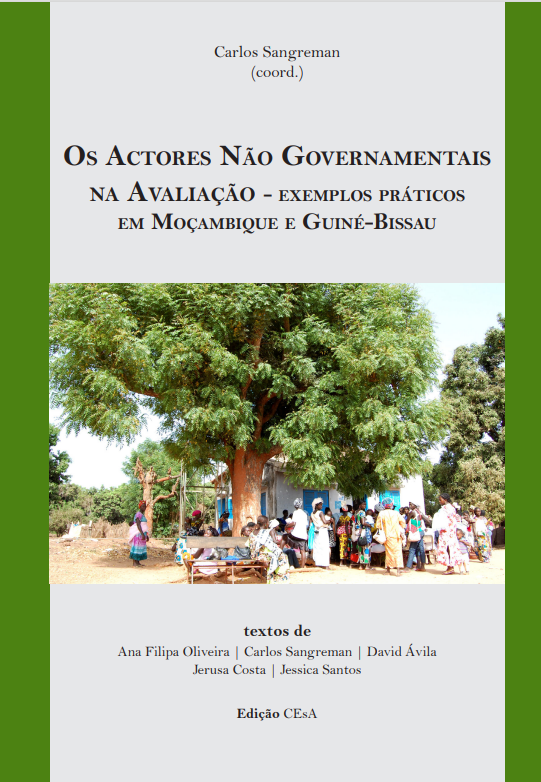
Os Actores Não Governamentais na Avaliação: Exemplos práticos em Moçambique e Guiné-Bissau
Abstract:
This work was conceived with a specific approach: the evaluation of the projects was conducted first, and only after its completion was the idea of publishing a small book on the evaluations considered. Since there was no coordination or dialogue between the “logic of theorization” and the “logic of practice” in the evaluation process intended for the evaluators (something that would undoubtedly have been interesting if done prior to the project evaluations), it was not feasible for the publication to revise certain aspects of the evaluations to systematically incorporate the international debate on the methodologies employed.
The book begins with an introductory section featuring a first chapter by Ana Filipa Oliveira, who provides a historical overview of ideas on evaluation and its institutionalization by various cooperation funders. In the second chapter, Jessica Santos analyses foundations as actors in the field of cooperation, drawing on her master’s research.
The second part contains a chapter by David Ávila, evaluating the “Tree of Hope” project in Maputo Province, specifically in the town of Namaacha in the area of agricultural production, which includes a significant research component, as well as the “Point by Point with Health” project in Inhambane. Jerusa Costa authors the following chapter, where she evaluates a set of projects supported by the Calouste Gulbenkian Foundation in the area of health in Guinea-Bissau. This chapter concludes with a response from ACEP to Jerusa Santos’s evaluation of the project “Women and Development: Self-employment and Self-confidence.”
Finally, Carlos Sangreman writes the conclusions and recommendations, proposing the effective institutionalisation of evaluation in the context of non-governmental cooperation through the implementation of a pilot certification project.
Cite this book:
Sangreman, Carlos (Coordenação) .(2014). Os actores não governamentais na avaliação : exemplos práticos em Moçambique e Guiné-Bissau. Edição CEsA. Apoio Fundação Calouste Gulbenkian. 2014
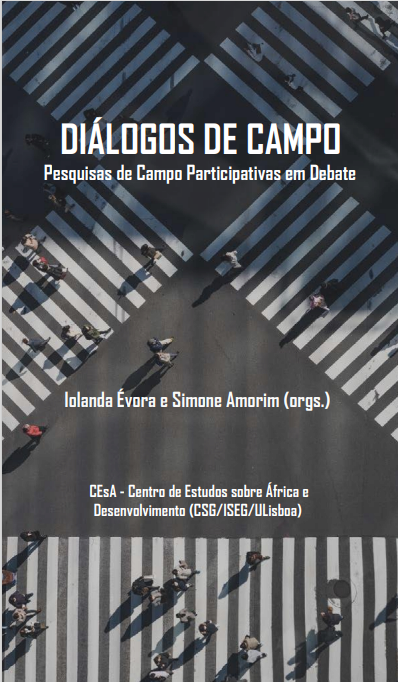
Diálogos de Campo – Pesquisas de Campo Participativas em Debate
Abstract:
This volume brings together concerns that serve as the basis for a continued debate on the mutual implications of research in the field of Social Sciences. The texts start from the common observation about the weakening of demands about “how we do it” in social research and deal with aspects related to fieldwork that are increasingly losing space in academia, essentially focused on producing results. From the fields of Social Sciences, Cinema, Literature, and Psychology, among others, the themes move between the dimensions of power hierarchies in research and the contexts that exponentiate them; the position and positionality of the researcher, and where we are placed by our interlocutors or people in the situations addressed. Specifically, they reflect on participatory methodologies and changes in knowledge production; ethnography and epistemic decolonization when the researcher does research in their life context; the interferences and determinations dictated by the field, during research; collaborative or participatory research, whether with refugee associations, in the field of artistic training or action research on bicycles and the city. Furthermore, the researcher’s subjectivity and writing regarding anti-racist cinema are addressed; as the implications of the researchers themselves in researching topics such as the impact of the pandemic on women, cultural heritage, or an object present, simultaneously, on different continents. The classic questions of the debate on methodology are present, which are, in fact, the foundations of current affairs, bringing different nuances of the contemporary debate, in social research, at a time when easier access to information reduces the distance and access of society (and the subjects of social research) to the knowledge about themselves produced in academia. This book was designed within the scope of the methodology workshops of the Afro-Port project (FCT/CEsA) and coincides with the project’s objective of contributing to a program in horizontal methodology and grounded methodology that is original, innovative and transdisciplinary, sustained by the interest in dialogue between academic and non-academic/scientific and non-scientific discourse.
Quotation:
Évora, I. e Amorim, S. (2023). “Diálogos de Campo – Pesquisas de Campo Participativas em Debate”. Lisboa, CEsA/CSG. ISBN 978-989-54687-4-4
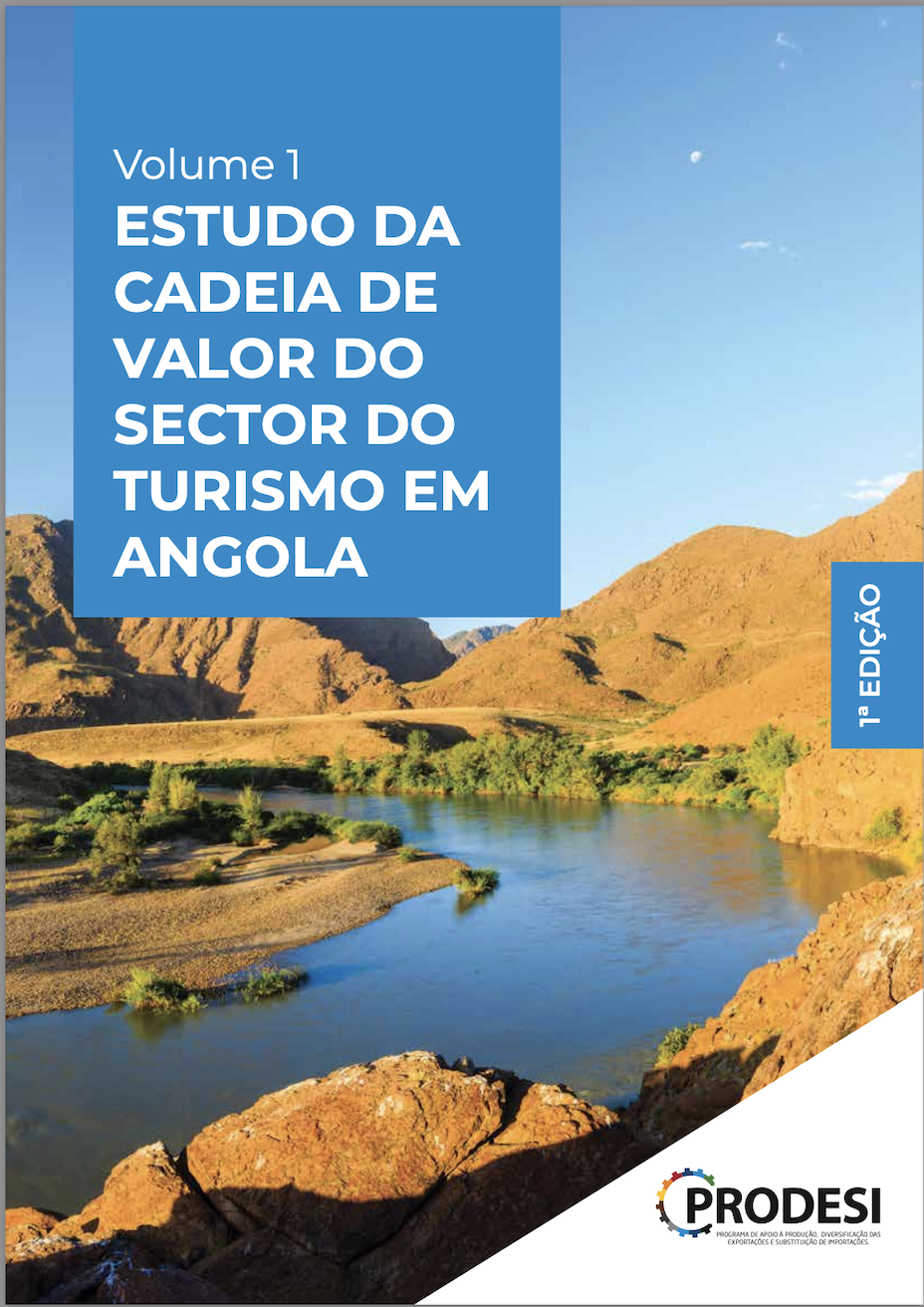
Estudo da cadeia de valor do setor do turismo em Angola – 1ª Edição
Abstract:
Tourism has grown steadily at an international level, both in terms of the number of tourists and in terms of revenue generated. However, Angola has not followed this trend, so it is not surprising that the weight of tourism in the country’s GDP is reduced (less than 1% in 2018). This situation is all the more serious as the countries in the region all have a much higher contribution from tourism to the GDP than Angola. The aim of this report is to identify the main weaknesses of the value chain that underpins tourism activity and to propose a set of measures and recommendations to be implemented within the scope of PRODESI.
Quotation:
Sarmento, Eduardo Moraes e PAHL Consulting (2020). Estudo da cadeia de valor do sector do turismo em Angola. Volume 1. Banco Africano de Desenvolvimento e Ministério da Economia e do Planeamento.
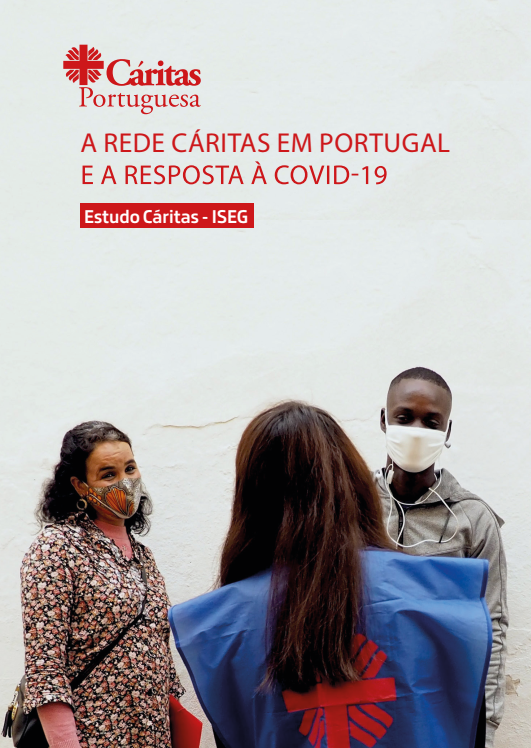
A Rede Cáritas em Portugal e a Resposta à Covid-19
Resumo:
A Rede Cáritas em Portugal e a Resposta à Covid-19 analyzes the importance of the social action of the Cáritas Network in Portugal in an unexpected and health emergency context, by documenting the organization’s response to the Covid-19 pandemic. An analysis is made of the continuity actions, but also of the innovations that emerged during the first year of the pandemic. With a presence that covers all the districts of Mainland Portugal and Islands, the Cáritas Network in Portugal developed, for the first time, a National Program of direct support to families in the form of goods and food stamps, as well as occasional and urgent financial support intended for payment of basic needs such as rent, health and electricity expenses, to a considerable number of beneficiaries (10,444 people, 3,205 families). The study shows that the Cáritas Network in Portugal was able to continue the food support activities and occasional support that it was already developing, given a greater demand from families: 60% of people who sought support from Cáritas in this period had never resorted to this kind of help.
Citação:
Pais Bernardo, Luís, Ana Luísa Silva, Renata Vieira de Assis e Luís Mah (Coord.). 2021. “A Rede Cáritas em Portugal e a Resposta à Covid-19”. Estudo Cáritas / CEsA-ISEG. Lisboa: Cáritas Portuguesa. Agosto.

Estudos sobre o Oceano Índico: antologia de textos teóricos
Estudos sobre o Oceano Índico: Antologia de Textos Teóricos is a book that gathers eleven theoretical texts by some of the most important thinkers on Indian Ocean Studies (IOS). This set of texts translated into an anthology, among other aspects, intends to give an account of the disciplinary polyphony that counter-punctuates the history of the Indian Ocean, while reflecting on the solidary cultural networks that are woven in the liquid and insular spaces, ports and port cities that climb the Indian Ocean rim from the African continent to India, based on the assumption that the Indian Ocean configures an identity and cultural geography of transnational nature.
Abstract:
Estudos sobre o Oceano Índico: Antologia de Textos Teóricos is a book that gathers eleven theoretical texts by some of the most important thinkers on Indian Ocean Studies (IOS).
In the framework of the Project NILUS – Narratives of the Indian Ocean in the Lusophone Space (https://cesa.rc.iseg.ulisboa.pt/nilus/), the research group started to map the main lines of disciplinary reflection in this area through a survey of theoretical texts written in English and French, by historians, writers and scholars of the human and social sciences, from South Africa, Mauritius, Reunion Island, Madagascar and India.
This set of texts translated into an anthology, among other aspects, intends to give an account of the disciplinary polyphony that counterpointingly animates the history of the Indian Ocean, while reflecting on the solidary cultural networks that are woven in the liquid and insular spaces, in the ports and port cities that climb the Indian Ocean rim from the African continent to India, based on the assumption that the Indian Ocean configures an identity and cultural geography of a transnational nature. In addition, there is also the need to re-signify and re-articulate this field of studies in Portuguese-speaking contexts through a critical and methodological dimension not necessarily related to the imperial narrative, especially now that the very notion of discoveries and discoveries is under a deep – and necessary – conceptual, historiographical and political scrutiny prompted by the project of creating a Museum of Discoveries.
In the texts translated here, the various types of religiosities and peoples, travellers and workers are also represented and historised, with their experience of migration and displacement, reconfigured in a similar material culture, in which gastronomy, cloths and maritime practices are given a prominent role. The topics of the sea, such as boats, monsoons, fishing and networked narratives about travel imaginaries and myths, are also other aspects that fall within diversified disciplinary articulations such as ecology and ecocriticism. In fact, the presence of the non-human – in its multiple material, geological, organic, non-organic declinations, etc. – in the texts gathered here, points to the growing interrogation, already raised by Isabel Hofmeyr, about the theoretical emergence of ‘oceanic ontologies’ through which to rethink the oceans – and the Indian Ocean in particular – not only as backdrops and contexts, but also as actors/subjects/producers of narratives.
Quotation:
Leite, Ana Mafalda, Elena Brugioni e Jessica Falconi, org. (2020). Estudos sobre o Oceano Índico : antologia de textos teóricos – excertos. Lisboa: CEsA/ISEG. URL: https://www.repository.utl.pt/handle/10400.5/19965

Inovação para os objectivos de desenvolvimento sustentável
Inovação para os objectivos de desenvolvimento sustentável by Luís Pais Bernardo is a guide to perplexity. Innovation for Development is the subject of reports, studies and international conferences. Laboratories, centres and initiatives multiply. Innovation models, innovation at scale and the impacts of innovation are discussed. But the fundamental questions remain. What is Innovation (for Development)? What is it for? How is it done? And is it worth doing? These are the questions that the entire international development community has been asking, without pause, for a decade. This report is a guide that does not aim to discover the origin of the practices and discourses of Innovation for Development. Nor do we intend to draw up a compendium of innovations. Our ambition is somewhat more pragmatic: to provide concrete answers to immediate questions and to help build a stronger debate on development, development cooperation and innovation in development cooperation. Where necessary, we explore important questions that are reflected in innovation practice: for example, Innovation for Development is an answer to the problem of ODA effectiveness and a priority of the 2030 agenda. Why does this matter? Because it has implications for the financing, practice, impact, scale and evaluation of development cooperation.
Abstract:
What is Innovation for Development? What is it for? How is it done? And how does it differ from innovation in other sectors? This report is an answer to those questions. Between 2015 and 2030, the Sustainable Development Goals are the great global challenge. Innovation for Development emerged in response to a complex debate on aid effectiveness. Today, the questions are different: how can we innovate to achieve the SDGs? In this report, we focus on clarifying basic terms: innovation, scale and impact. We discussed the need to structure Innovation for Development around five components: learning, creating, organizing, leading and collaborating.
Quotation:
Bernardo, Luís Pais (2020). Inovação para os objectivos de desenvolvimento sustentável. Lisboa: CEsA – Centro de Estudos sobre África e Desenvolvimento/ISEG. URL: https://www.repository.utl.pt/handle/10400.5/20052
Access the article here.
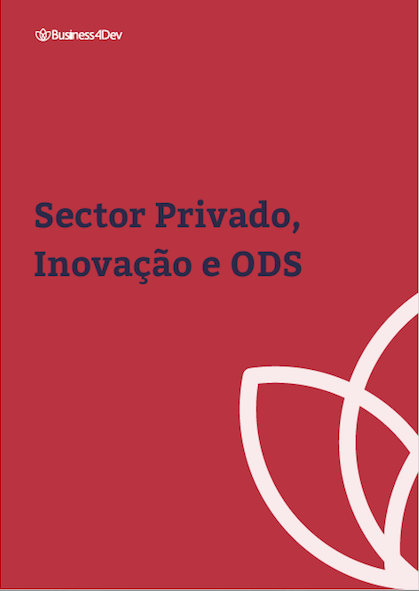
Sector privado, inovação e ODS
In Sector privado, inovação e ODS, Luís Pais Bernardo explores the reasons why companies can and should adopt business models aligned with the SDGs, in partnership with international cooperation actors. Partnerships are key to this transformation; today, business economic activity tends to move along global value chains in which the intervention of international cooperation for development, around the 2030 Agenda, will have an increased impact. In this context, the inclusive and responsible management of the procurement of services and products on a global scale by companies becomes increasingly important. Partnerships, global value chains and procurement of goods and services are the three areas explored in this report.
Abstract:
The central role of the private sector in international development cooperation is one of the innovations of the 2030 Agenda. In 2014, UNCTAD estimated the annual funding gap for the Sustainable Development Goals (SDGs) at US$2.5 billion. Following the Busan summit and the conclusions of the Millennium Development Goals (MDGs), the capabilities, resources and skills of the private sector are no longer viewed with suspicion, but are seen as central to achieving the 17 SDGs. Innovation, as a pillar of the private sector in the 20th century XXI, is the new paradigm. In this report, we explore the reasons why companies can and should adopt business models aligned with the SDGs, in partnership with international cooperation actors. Partnerships are key to this transformation; today, business economic activity tends to move along global value chains in which the intervention of international cooperation for development, around the 2030 Agenda, will have an increased impact. In this context, the inclusive and responsible management of the acquisition of services and products on a global scale by companies, assumes an increasing importance. Partnerships, global value chains and procurement of goods and services are the three areas explored in this report.
Quotation:
Bernardo, Luís Pais (2020). Sector privado, inovação e ODS. Lisboa: CEsA – Centro de Estudos sobre África e Desenvolvimento/ISEG. URL: https://www.repository.utl.pt/handle/10400.5/20053
Access the article here.
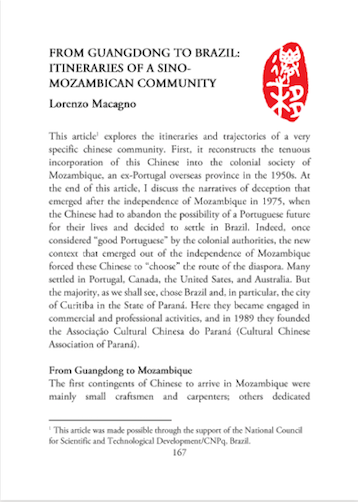
From Guangdong to Brazil: Itineraries of a sino-mozambican community
From Guangdong to Brazil: Itineraries of a sino-mozambican community by Lorenzo Macagno explores the itineraries and trajectories of a very specific Chinese community. First, it reconstructs the tenuous incorporation of this group into the colonial society of Mozambique in the 1950s. At the end of this article, I discuss the narratives of deception that emerged after the independence of Mozambique in 1975, when the Chinese had to abandon the possibility of a Portuguese future for their lives and decided to settle in Brazil.
Abstract:
This article explores the itineraries and trajectories of a very specific chinese community. First, it reconstructs the tenuous incorporation of this Chinese into the colonial society of Mozambique, an ex-Portugal overseas province in the 1950s. At the end of this article, I discuss the narratives of deception that emerged after the independence of Mozambique in 1975, when the Chinese had to abandon the possibility of a Portuguese future for their lives and decided to settle in Brazil. Indeed, once considered “good Portuguese” by the colonial authorities, the new context that emerged out of the independence of Mozambique forced these Chinese to “choose” the route of the diaspora. Many settled in Portugal, Canada, the United Sates, and Australia. But the majority, as we shall see, chose Brazil and, in particular, the city of Curitiba in the State of Paraná. Here they became engaged in commercial and professional activities, and in 1989 they founded the Associação Cultural Chinesa do Paraná (Cultural Chinese Association of Paraná).
Quotation:
Macagno, L. (2021). “From Guangdong to Brazil: Itineraries of a sino-mozambican community”, in: André Bueno & Daniel Veras (eds.) Studies in Chinese Migrations. Brazil, China and Mozambique, Rio de Janeiro: Projeto Orientalismo/UERJ, pp. 167-187.
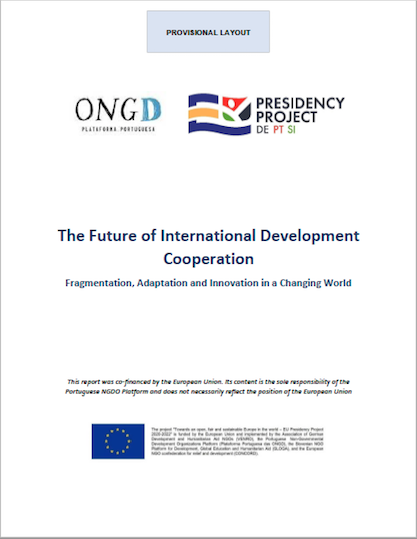
The future of international development cooperation: fragmentation, adaptation and innovation in a changing world
The future of international development cooperation: fragmentation, adaptation and innovation in a changing world, by Ana Luísa Silva, Luís Mah and Luís Pais Bernardo, stemmed from the need perceived by the Portuguese Platform of NGDOs (PPNGDO) to produce knowledge that will help its members carry out a more informed analysis of the changes in International development cooperation (hereafter, development cooperation). Understanding the transformation underway and the challenges it presents is fundamental for the PPNGDO and its members to jointly outline possible paths into the future, setting out the future direction of action, their priorities and their options.
Abstract:
This study stemmed from the need perceived by the Portuguese Platform of NGDOs (PPNGDO) to produce knowledge that will help its members carry out a more informed analysis of the changes in International development cooperation (hereafter, development cooperation). Understanding the transformation underway and the challenges it presents is fundamental for the PPNGDO and its members to jointly outline possible paths into the future, setting out the future direction of action, their priorities and their options. The study was conducted with three goals in mind: 1) tracing the progress of development cooperation over the past 20 years, while reflecting and discussing the ongoing changes in a multiplex world; 2) addressing the challenges faced by key public and private development cooperation actors view of the ongoing change; 3) contributing to the discussion on this new configuration of development cooperation by offering guidelines based on adaptation and innovation for thinking and acting in a complex, fragmented and fragile multiplex world. This study sought to review the available academic and grey literature (reports from development cooperation organisations, blog posts, online discussions and interviews), and where possible, interviews with professionals from international organisations – both governmental and non-governmental – were used. In the introduction of the study, we contextualise development cooperation in a changing world and describe the framework for discussion applied to each of the following sections: In Part I, changes in development cooperation and ODA are addressed, based on three issues that are crucial for the sectors: quantity, quality and legitimacy. Part II highlights the challenges faced by key public and private actors of development cooperation – either ‘“traditional’” or ‘“new’” ones. Finally, Part III outlines a few guidelines on complexity, fragmentation, and fragility, which can provide useful tools for analysis in the new context. To conclude, we offer civil society organisations some points for reflection.
Quotation:
Silva, Ana Luísa, Luís Pais Bernardo e Luís Mah (2021). The future of international development cooperation : fragmentation, adaptation and innovation in a changing world. Lisboa: Plataforma Portuguesa das ONGD. URL: https://www.repository.utl.pt/handle/10400.5/21214
Access the article here.





